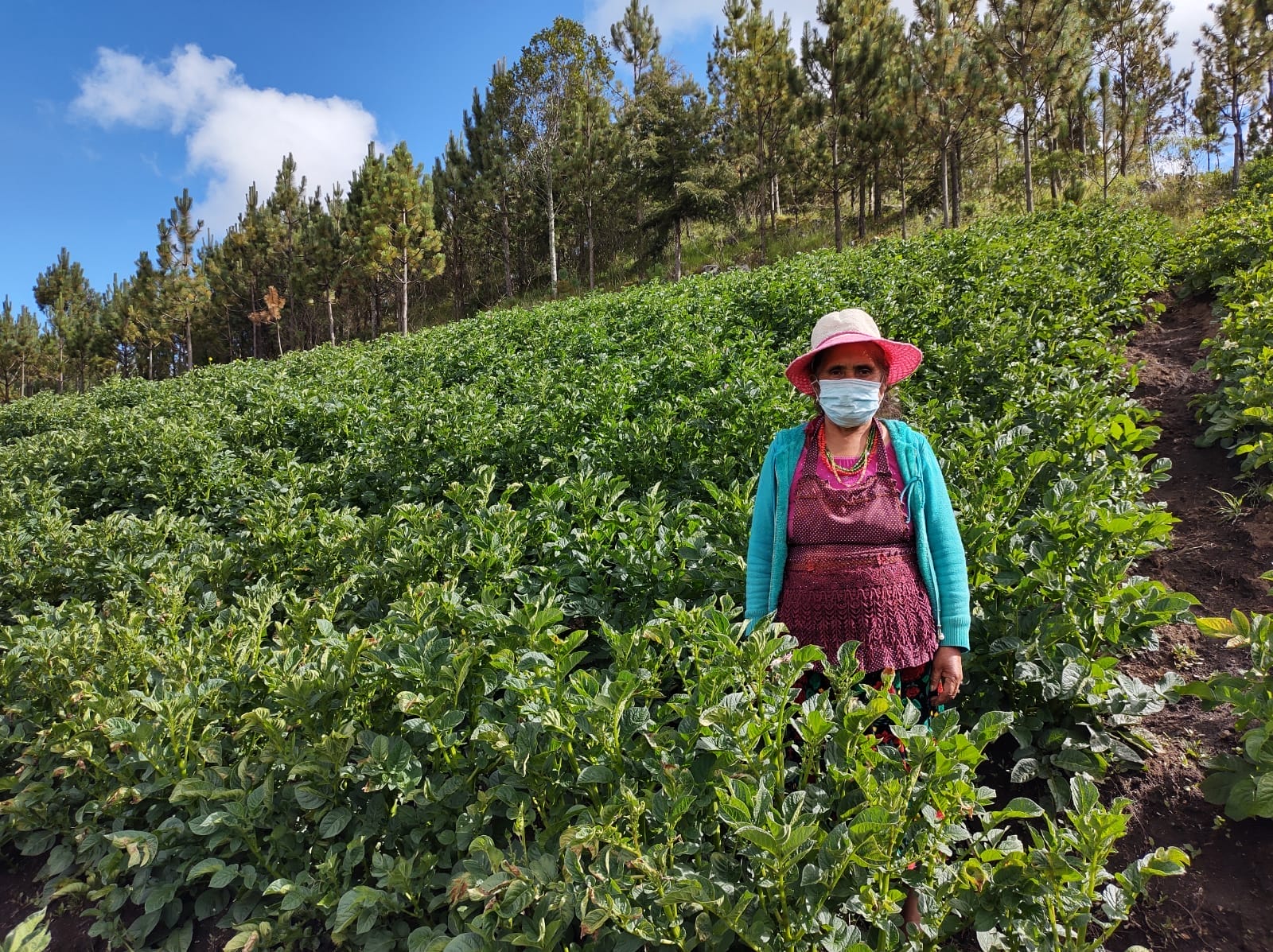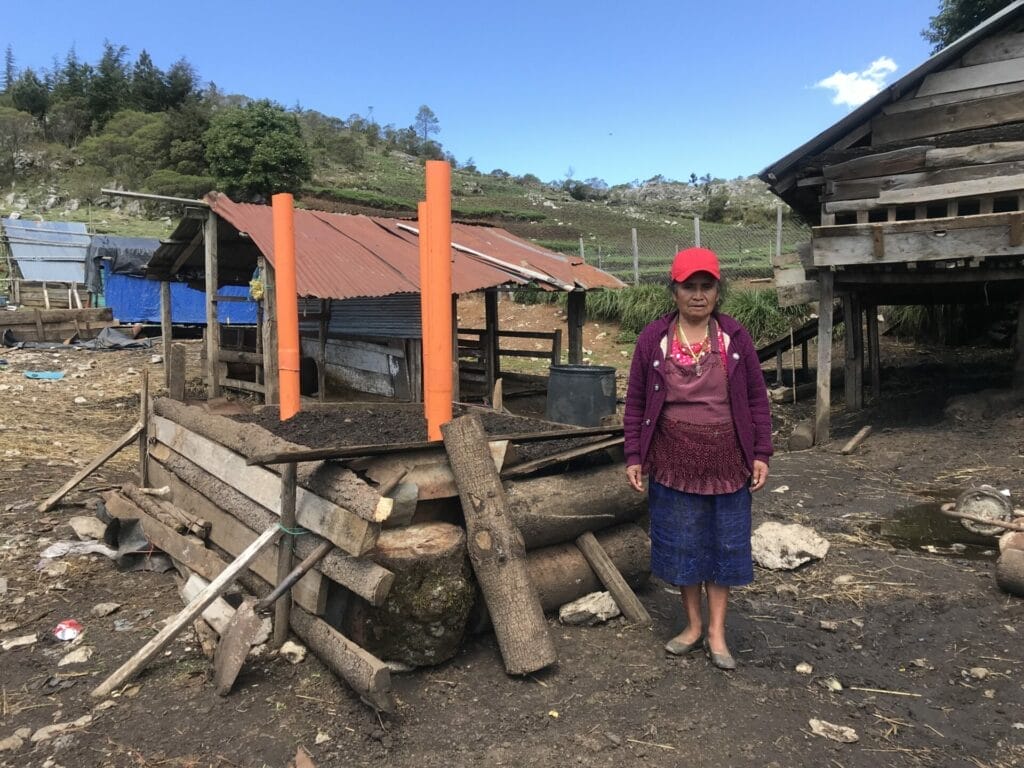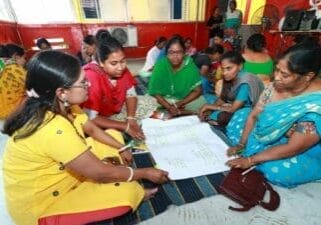News > Blog
A Holistic Intervention to Overcome Multiple Barriers to Women’s Entrepreneurship in Guatemala
Published 02/28/2024 by Global Communities

By Mabel Bejerano, Global Technical Advisor for Women’s Empowerment and Savings Groups
Toribia – a 54-year-old mother of eight from the Western Highlands of Guatemala – has long been a leader in her family, who strives to make a consistent income with their land and livestock. Because families in the Western Highlands are typically producers and consumers of their own food, they are reliant on agricultural activities to survive and can be heavily impacted by cyclical climatic shocks and natural disasters. They also face high levels of food insecurity, child malnutrition, low literacy rates and health crises.
Like many women of her generation raised in the Sierra de los Cuchumatanes mountains, Toribia never attended school or learned to read or write. She always looked for ways to increase her knowledge and skills, but in her remote community, opportunities for women are not readily available. Agricultural and business training is infrequent and often only accessible for men. When Global Communities’ staff visited Toribia to present the opportunity to join an advanced business skills training program called Project META, she was thrilled.
developing business skills
Global Communities implemented Project META across 16 communities in the Chiantla and Malacatancito municipalities of Huehuetenango, Guatemala. After a gender-focused needs and market assessment, the project team identified opportunities for women who had been a part of the savings and lending groups under Global Communities’ signature Women Empowered Initiative. Between December 2020 and December 2021, Project META offered resources and education to over 150 women with the goal of strengthening their agricultural skills, developing greater access to local markets and generating sustainable sources of income.
Project META supported them in developing technical productive skills, business management and financial literacy, while leveraging their existing skillsets and expertise. Individualized work plans were created for every participant, and they had access to project mentors through texting and calling, virtual and face-to-face sessions, learning tours and group workshops.

Putting learning into practice
To increase her family’s income, Toribia embarked on a one-year journey with Project META, gaining skills in post-harvest management and storage, animal production, business management, branding and financial literacy. She identified new products, improved product quality and production systems, and learned how to better manage all of the production aspects of her farm. Toribia and other participants received individualized mentorship to support their progress, including advancing the accounting skills needed to manage sales and experimenting with growing techniques to improve produce quality. Early in her involvement with Project META, Toribia put these lessons into practice in her newly planted potato patch. Using high quality seeds and organic fertilizer comprised of livestock feces and microorganisms, she grew potatoes of such high quality that the seed company offered to buy her entire initial harvest. The META team invited other project participants to visit to learn and see how these activities led to increased productivity and soil quality. As a result, many more women decided to adopt practices that Toribia tested on her farm.
“It doesn’t matter how old you are, what matters is to keep learning and teaching others,” said Toribia.
In addition to learning about agricultural practices, Toribia also benefitted from META’s financial literacy training, which gave her the skills needed to consider profitability when making decisions on her farm. Now, she does the math to decide what to invest in based on the cost structure and profitability of her ideas.
addressing unequal gender norms
Toribia and her husband also participated in Journeys of Transformation – a gender-transformative intervention adapted to the Guatemala context by Global Communities in partnership with Equimundo. The intervention facilitated couples’ dialogues, which helped shift social norms that limit women’s economic empowerment. The dialogues proved successful in improving couples’ communication as well as equity in household decision-making and care work, while reducing the acceptance of intimate partner violence.
evaluating impact
By the end of the yearlong program, Toribia was selling her own homemade organic fertilizer to members of her community. She saw an increased income from selling her high quality potatoes, eggs and chickens thanks to the improved production practices she had learned.
META’s final evaluation showed that most participants saw similar positive impacts from the project.
- 98% of participants implemented new technical agricultural practices,
- There was a 63% increase in average monthly income for those who applied new agricultural techniques,
- 70% of participants increased their number of clients,
- 50% began selling their products in at least one additional location,
- Animal survival rates increased from 20% to 80%,
- Women reported increased confidence in their ability to successfully run a business and contribute to the welfare of their families,
- Women’s partners reported being more aware and supportive of their wives in their economic activities.
Project META shows that supporting women entrepreneurs with individualized and holistic interventions can help them overcome multiple barriers to economic success, leading to increased productivity and incomes. It also strengthens women’s confidence and decision-making power within their households.
There is still more to be done: from improving women’s access to climate smart agriculture techniques and business management skills, to a more equal division of household work and decision making. Gender-transformative programs are vital in supporting women entrepreneurs like Toribia.






